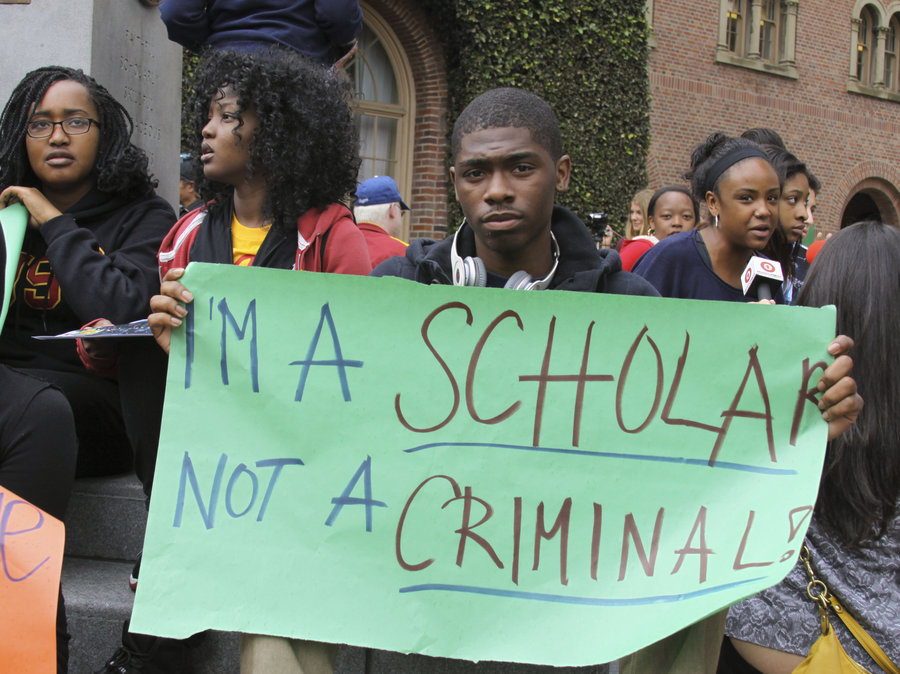The USC Student of the Future
/
I was asked to deliver some remarks before the USC Faculty Senate a week or so ago. They were trying to inspire discussion about the future of education. Nothing I said here was specific to USC so I figure I would share my notes here. I draw heavily on insights from three MacArthur Foundation initiatives -- Digital Media and Learning, Connected Learning, and Youth and Participatory Politics. I am now working with them on their Civic Media Initiative.
I am often asked about the concept of the digital native. First of all, I think the opposition set up between digital native and digital immigrant is grounded in some really troubling assumptions. But bracketing that, the myth of the digital native profoundly misleads us as we think about this generation. Certainly they have come of age at a time when digital and mobile media has become taken for granted as part of the media landscape, BUT access to technology, resources, mentorship has been unevenly distributed both within the U.S. and around the world. The digital divide refers to unequal access to technology, the participation gap refers to unequal access to opportunities and cultural capital. The result is a whole array of different degrees of access to digital and mobile media and the opportunities they represent for young people.
Those who have access to digital and mobile technology have been part of a participatory turn within our culture. Many of them will have played active roles producing and sharing media, engaging in social networks online, and increasingly, using social media to mobilize around political campaigns and civic issues. Most of those experiences have occurred outside of formal educational spaces and disconnected from, if not actively discouraged by, their teachers. In many cases, they have found their experiences as fans and gamers more intellectually challenging, more engaging, and more rewarding than their experiences with formal education.
If their online experiences have been participatory, collaborative, playful and exploratory, their classroom experiences have been regimented by our current obsessions with high stakes standardized curriculum, which often results in teachers teaching to the test, simplifying their expectations, and providing a precise map of what knowledge matters. The result has been a generation of students that is risk adverse and disassociates the learning that takes place outside of the classroom from the knowledge that will matter for their own success.
Formal education continues to promote the idea of the autonomous learner with most forms of collaboration seen as cheating. The informal learning environment is much more collaborative and networked, helping to promote the ideal of collective intelligence. The jobs they will enter will require strong collaboration across people with diverse knowledge, skills, and background. This is especially true as we confront so called wicked problems that are interdisciplinary by nature.
These youth will change jobs multiple times across their career and in many cases, will change careers more than once across their life. They will also move many times across their life, often shifting regions or even countries in search of career opportunities. All of this requires intellectual flexibility -- the ability to adjust to rapidly changing circumstances and the ability to remain open to new possibilities. This also requires life-long learning.
These students have come of age in an era marked by dramatic demographic shifts within the U.S. (leading towards a point where America is a minority-majority nation) and globalization beyond our borders (as patterns of migration result in an ever more complex set of relations between races, ethnicities, and cultures). This is going to require a cosmopolitan spirit as they again adopt to change and embrace diversity. And it is going require a deeper understanding than their parents have had about the circumstances bringing about those changes.
The next decade is going to see an increased politicization of American youth, a trend which began with Obama, intensified with Bernie Sanders, and now is reaching its boiling point in the resistance movements against Trump. Or, read in another way, has been shaped by the Occupy, Dreamer, Blacklivesmatter and the Women’s March movements.
These are not Twitter Revolutions. Young activists are certainly using the tools and processes they have learned through a lifetime of using digital and mobile technologies, participating in online social networks, etc. but our research showed us that they are seeking to make change “by any media necessary,” taking advantage of a range of media-related tactics to get their messages out around an increasingly concentrated mass media and to be heard above competing messages in the social media space. The ability to move between the affordances of different media is necessary given the remaining inequalities of access represented by the digital divide and the participation gap.
My research team interviewed more than 200 young activists and we consistently heard that the language of American politics as broken -- both exclusive and repulsive -- and they are seeking a new language which draws on elements of popular culture to enhance the civic imagination. This is one of many ways that young people have acquired skills through their play which they are now deploying for more serious purposes.


